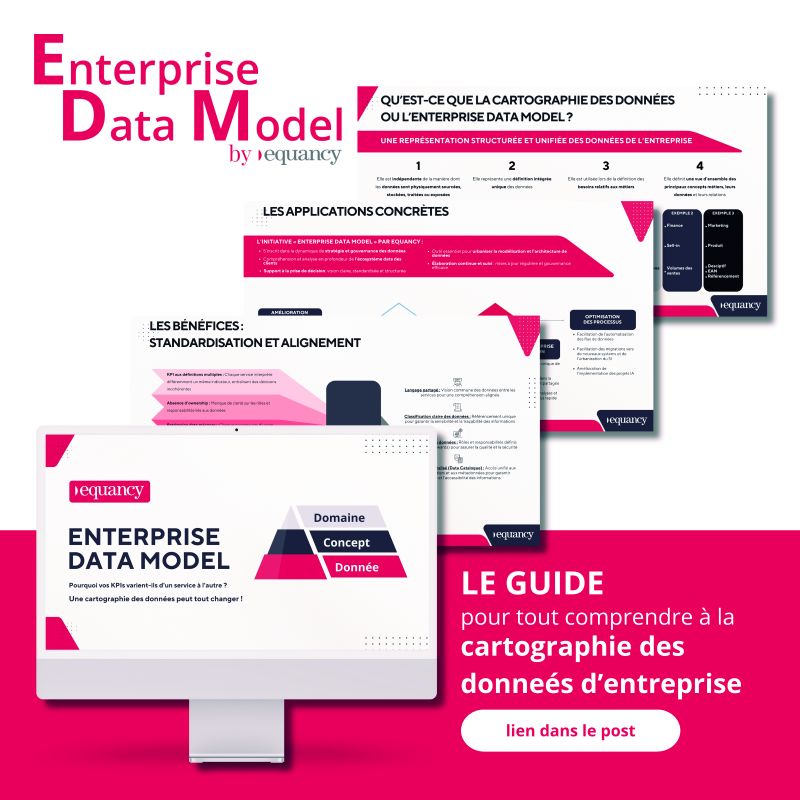And if it were Brad Pitt who was talking to you about Data Governance?
How can one make business understand the importance of governed data? In other words, how can Data Governance be made "fun" to make people want to get into it?
That's a broad topic! Let's start with the beginning: a concept that contains the word "governance" is not very attractive by definition... We agree, right?
So, how can we make this subject "desirable" or at least "understandable"? That would already be a good start. And going further... how can we make this subject "interesting"? At Equancy, our belief is that we are using the wrong language to make people understand its necessity.
Starting from the issues of data governance doesn't speak to the Business or to senior executives.
Our observation is that when data governance is mentioned, the subject is often approached from the wrong angle, starting with the finality of data governance issues, such as:
- "Having quality data"
- "Managing data traceability"
- "Having a common definition"
- "Defining data roles and responsibilities..."
- "Mastering and knowing the data assets"
- "Making data and knowledge accessible"...
- "Having the right tools with data catalogs..."
And so on...
These are all justified principles and terms, but they don't speak to the Business and, let's face it, they are intimidating. With a common result that doesn't necessarily make people want to get into it...
So, how can we do it? Several approaches are possible:
1. The pragmatic approach: Start with the Business's daily issues, their problems and make data governance a solution
We don't do data for the sake of data. Just as we don't do data governance for the sake of governing the data and putting a nice emperor's hat on it. Governance is therefore just a management process, a facilitator, but one that must serve the company's strategy.
Therefore, before anything else, we must start with the pain points, the ones that slow down the Business, prevent it from accelerating its growth or going further. Only then should we link these blockages to the concepts of governance to explain how data governance is a solution to their problem and not just another problem in their daily lives.
Example: Definition problem > Inconsistency between services > Poor decision-making > Poor customer experience
Let's take a classic example of a company that uses two different definitions for the term "new customer" in two different departments.
In marketing, a "new customer" is defined as a user who has never made a purchase before. In customer service, a "new customer" is defined as a user who has not made a purchase in the last six months.
Obviously, when a user who made a purchase more than six months ago returns to the website and makes a new purchase, customer service will consider them a new customer and record a new acquisition, unlike the marketing department.
This can skew marketing data and lead to poor business decisions, as the company would focus on acquiring new customers when in reality it could better retain existing ones. Solution brought by data governance: Having a single definition repository can be used and disseminated to all services for different use cases. "Data catalogs" tools force services to agree on a single definition.
Normally, this speaks a little more to business.
2. The playful approach: Well, this is still moderately "fun" and "desirable" story. What if we completely step out of the box for once?
How to involve and give desire to employees who are farthest from data to Top management, passing through those who would seem to be the most concerned with a topic that, at first glance, doesn't interest them? How to make it fun and playful?
What if we used the power of fiction, or more precisely, the power of design fiction applied to your contexts?
Let's imagine the future of your company in 2030 or 2050. And let's imagine in these futures scenarios where data is fully, partially, or even ungoverned...What are the new offers? What is the competitive positioning? How is your company behaving? What have they invented? What have they missed? What have they understood?
Project yourself and your colleagues into these futures to gauge the potential of controlled or uncontrolled data, through various scenarios that are more or less fanciful, depending on your desire to think outside the box.Let's trust your power of divergence to absorb the concepts, to appropriate them. There's nothing like appropriation through example.
You can test the concept in one profession at first, or be ambitious and apply the concept to all of your professions. The choice is yours!
3. The innovative approach: Still not playful and fun enough for you? What if we went even further by adding a dose of inclusivity, collaboration, creativity, and Brad Pitt...?
We learn better while having fun, don't we? So let's have some fun!
And what if, once the design fiction scenario is chosen, we turn it into a participatory and collaborative series where your employees and you... are the actors. A fantastic tool for cohesion and engagement, Julien Laurent founded "Le fil en mouvement" to boost employee engagement by giving them the role of the story's hero.
Each story is built to serve your goals, whatever they may be (customer relationship, commercial conquest, internal program launch...). And what if we combined design fiction, data governance, and participatory series, what would that look like? In partnership with "Le fil en mouvement", Equancy invites you to discuss it and imagine what it could be like :) I don't know about you, but I'd love to try it...
So, are you more pragmatic or playful? Innovative?
Do you want to know more, simply discuss it, and think about what it could look like in your company?These approaches can also be applied to broader data acculturation initiatives than governance. So are you ready to make Data more fun?
Don't hesitate any longer and contact me. It will be a pleasure to think about it together, as well as with Julien if you're more interested in the innovative approach 😊
Alexis Rousset
Director of Strategy Consulting Data & Impact




